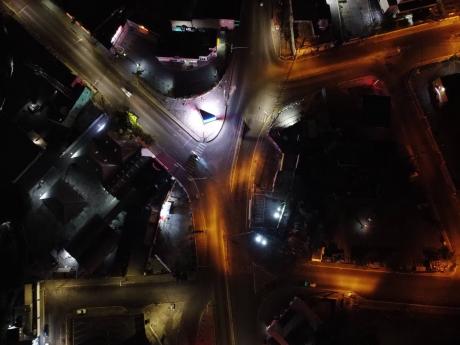Curfew extended as murders plunge
Prime Minister Andrew Holness’ declaration yesterday that the Government will extend an islandwide nightly curfew is expected to further drive down murders in Jamaica, a consequential benefit to the administration’s attempt to tighten the screws on the COVID-19 pandemic.
As Jamaica’s coronavirus infections rose to 63 yesterday, Holness said that measures aimed at limiting the transmission of the highly contagious disease, including work-from-home stipulations, closure of the island’s borders, and among others, would also be extended in accordance with the relevant orders.
No dates have yet been provided on the extensions.
The nationwide curfew, which began at 8 p.m. on Wednesday, April 1, was set to expire at 6 a.m today.
Data from the Jamaica Constabulary Force (JCF) indicate that murder is at its lowest in more than two months – a collateral advantage to the economic meltdown that has seen businesses and schools shutter, traffic to dissipate, and commercial activity to stall.
As at Saturday, April 4, murders, in particular, had declined to less than one per cent above last year’s count over the period January 1-April 5.
Last Friday, Prime Minister Andrew Holness said that while the focus is on the country’s COVID-19 response, criminals should not believe that the spotlight was being turned from them, promising that the security forces were keen on staunching bloodshed.
“I am not giving warning to any criminal, but I am going to be very clear that we are still targeting the criminals. We are still conducting the necessary operations and we are still interdicting and arresting criminals during this period,” affirmed Holness.
LESS THAN 1%
Information gleaned from the JCF in March showed that murders in the first 74 days of the year had plunged to just a little above two per cent than they were in 2019, coming from a high of 10 per cent weeks ago.
Twenty-one days later, the decline had steepened. Three hundred and sixty-one people were killed up to April 4, 2020, two more than for the corresponding period last year.
The downward trend coincides with the emergence of COVID-19 in Jamaica and increasing restrictions on movement and mass gatherings.
The figures show that the St Andrew North, one of the bloodiest police divisions in 2020, has seen the number of murders up to Sunday holding.
The division has recorded 29 murders this year. Weeks ago, it was trending above 250 per cent, but the fatality rate has since fallen by more than half to 123 per cent year-on-year.
There have been 29 murders recorded for St Catherine North, making it the joint second worst division alongside with St Andrew North.
St Andrew South remains the most murderous police zone, however, with 48 killings. Kingston Central has 26.
A combination of COVID-19 strategies and the states of emergency in St James, Hanover, and Westmoreland have also put a damper on criminal activity across western Jamaica.
Up to April 4, 2019, St James had recorded 42 murders. This year, 24 people have been killed, a decline of more than 40 per cent.
All other major crimes, including shootings and rapes, are showing declines.

